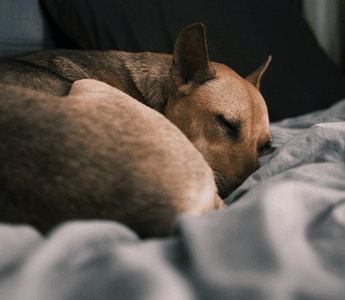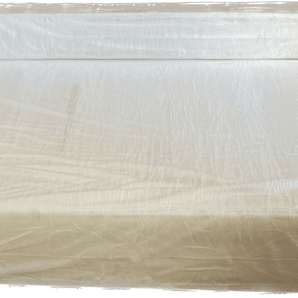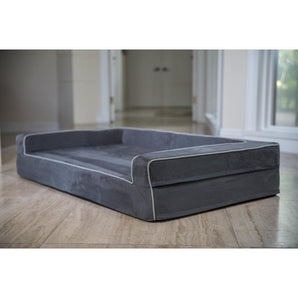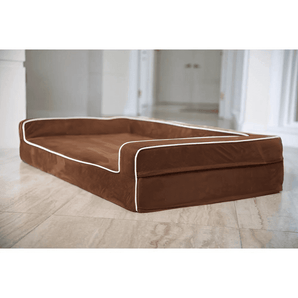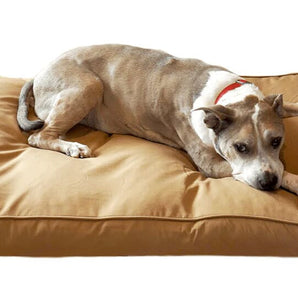If we adopted our dog's bedtime habits, we'd jump on the bed, run in circles a couple of times, scratch at the duvet, dig up the bedding, then flop down ready for a good sleep.
That would be weird, right? Have you ever watched your dog going through the motions, and wondered what he was thinking? Why do dogs scratch their bed?
Figuring out why our dog digs, scratches, and circles, will need some digging around in the past. Here are some of the reasons behind our dog’s strange habits and what we can do about them, along with some useful information.
Why Do Dogs Dig In Bed? Where This Habit Comes From
Way back before dogs were man’s best friend, they lived in the wild. Their habits kept them alive, and these behaviors can still be found in our domesticated dogs today. Digging, scratching, and circling were all part of finding a safe place to sleep each night. Let’s take a look at where the four different behaviors originated.
Digging
Dogs in the wild slept out in the open, exposed to the weather and predators. They would dig up their sleeping spots for two main reasons.
Temperature Regulation
Under extreme hot or cold conditions, a dog’s tendency to dig a sleeping hollow was generated by the need to regulate temperature. In icy cold conditions, dogs would dig down into the soil to find shelter and warmth.
In hot weather, digging a hollow into the soil offered the dog an opportunity to cool down. Dogs regulate their temperature through their footpads. Digging puts their footpads in direct contact with the cool soil.
Territorial Marking
Dogs are eager territory markers and will often urinate on objects to stake their claim. This isn't the only way they can stamp their name on something. Dogs have scent glands in their paws that will mark the area they're digging in with their scent. Digging is a dog's way of claiming its spot.
What to us may seem like a trashed blanket, will actually be something the dog has marked as its own. Dogs are creatures of habit and will happily return to a spot that carries their scent.
Scratching
Scratching is less destructive than digging and is all about the dog’s comfort, as we will explore in this article. Just as we fluff our pillows before bed, scratching is also a way of making a hard surface soft and comfortable. Breaking up a hard surface creates a softer surface to sleep on. Why do dogs scratch at the bed? It would move leaves and underbrush in to cover the bare dirt to make sleeping more comfortable.
Circling
The habit of circling a few times before lying down has been linked back to wolves. Before sleeping, a wild wolf would turn a few circles with their noses in the air. This helped them to find which direction the wind was coming from. They'd sleep facing the oncoming wind to warn them of the approach of an enemy.
Circling also had to do with tramping down the grass and leaves to make a comfier sleeping place. For warmth, wild dogs would circle in together and snuggle up to share body heat.
Circling has the added bonus of driving out any snakes, rats, or other critters that could cause problems for dogs.
Burrowing
Does your dog enjoy making a blanket fort? In the wild, dogs burrowed under dirt and leaves to create an insulated space to protect them from temperature extremes. It also provides camouflage to hide the dog's position and helps them feel less vulnerable. This burrowing instinct is what causes our dogs to bury themselves under their blankets, too.
Why Do Dogs Scratch Their Bed Now?
As dogs became domesticated, the need to do things for survival has fallen away, but behavior patterns remained written into their genes. When survival instincts show up in our safe, happy homes, they sure look strange.
Even though their actions aren't necessary for survival our dog's behavior can help us understand our fur buddies. Here are some other reasons a dog may take to digging in his bed.
Curiosity
It might be an interesting smell or the noise of something moving underneath the blankets that make your dog dig. Dogs are curious explorers by nature and a whiff or a squeak can set them off on a digging spree.
Stress or Anxiety Might Increase the Digging
Dogs feel anxious if there are changes at home such as the addition of a new pet or family member. Stressed dogs will tend to dig and scratch more. There is a fine line between scratching to relax or scratching out of anxiety.
If you notice that the pre-bed scratch is stressing your dog out more than calming them down, you can try distracting her with another toy. If you don't manage to bring down her anxiety levels, it might be time to talk to your vet.
Copy-Cat Bed-Scratching
Introducing a new dog to the family might make the existing dog’s bed-scratching habits worse, as they try to mark their site. Part of this could be territorial, but if the new dog is a happy-digger, it can easily rub off on the rest of the pack.
Maternal Instinct
A female dog close to delivering her puppies will go on a bed-scratching frenzy. Behavior like this is part of the canine nesting instinct and it's caused mostly by hormones. Her digging is to create a nest for her new pups to keep them warm and safe.
Territorial Behavior
Dogs are more likely to return to a bedding spot if they already feel it’s theirs. This may be why bed-scratching behaviors sometimes begin or intensify when a new pet or person has moved into the house, or there has been another type of major change in the household.

Sensory Stimulation
Just like us, dogs benefit from a sleep environment that stimulates their senses in a calming way. Creating a sensory haven for your dog can significantly enhance their sleep experience. Think about the colors, textures, and lighting in their sleeping area. Calming colors and soft, soothing textures can make a big difference. Gentle lighting, or even a nightlight, can help your dog feel secure.
Incorporating natural elements can also contribute to a restful atmosphere. A small plant or a water feature can create a serene environment that helps your dog relax. By paying attention to these sensory details, you can help your dog enjoy a deeper, more rejuvenating sleep, waking up refreshed and ready for the day.
Physical and Environmental Factors
The quality of your dog’s sleep is heavily influenced by physical and environmental factors. A comfortable sleeping environment is crucial for a restful night. Consider the temperature and humidity levels in your dog’s sleeping area. Dogs, like humans, sleep better in a well-ventilated room with a comfortable temperature range.
Noise levels can also impact sleep quality. Try to minimize loud noises and create a quiet, peaceful environment for your dog. Additionally, reducing exposure to electronic devices and screens before bedtime can help regulate their natural sleep-wake cycle. These small adjustments can make a big difference in helping your dog get the rest they need.
Physical Comfort
Physical comfort is a cornerstone of a good night’s sleep for your dog. A supportive mattress and comfortable pillows can make a significant difference. The type of bed and the materials used are crucial. For instance, a memory foam mattress can provide optimal support and pressure relief, ensuring your dog sleeps soundly.
Investing in high-quality bedding can help improve your dog’s sleep quality and reduce the risk of discomfort or pain. A well-chosen bed can support your dog’s joints and spine, helping to prevent issues like back pain. By prioritizing physical comfort, you can help your dog enjoy a more restful and restorative sleep.
Bed Type and Material
The type of bed and the materials used can significantly impact your dog’s sleep quality. Different bed types, such as memory foam, innerspring, or hybrid beds, offer varying levels of support and comfort. The material of the bed, whether it’s cotton, polyester, or bamboo, affects breathability and durability.
Some beds come with additional features like adjustable settings, massage functions, or temperature control, which can further enhance comfort. When choosing a bed, consider factors like support, comfort, and durability. A well-chosen bed can provide your dog with a cozy, supportive place to rest, ensuring they get the quality sleep they need.
When Does Digging or Scratching Become a Problem?
Digging and other destructive behaviors can be hard to train out of our dogs. as it is linked to a survival instinct. Part of surviving in the wild was the ability to make a safe, comfortable shelter. But when do these instincts cross a line and become a problem?
If our dogs destroy each new bed that we buy for them, or damage our wooden floors or other parts of our home by scratching, we'll need to address the issue. While our dog's instincts can never be removed completely, there are ways of minimizing the damage that they cause.
3 Ways to Scratch-Proof Your Dog's Bed
Digging and scratching aren't a problem until our dogs destroy something. An excited dog can convert a brand new pet bed to a ripped pile of fabric and stuffing without much effort.
While we may not be able to get our dogs to stop completely, there are some things we can do to lessen the damage caused.
1. Give Your Pooch a Nail Cut
A dog manicure once a month will keep our dog's nails short enough to prevent damage to his sleeping spot. It will also protect the rest of our furniture and wooden floors. Keeping our dog's nails short is healthier and will prevent the nails from infections. After trimming, file down sharp edges.
2. Give Them Other Ways to Play
If we find our dogs tearing up their bed as a game, not a pre-sleep ritual it could mean that they are under-stimulated. We can get them some new, interesting, toys. Make their walks a bit longer. Find other ways for the dogs to exercise. Keeping them occupied and happy will help make their bed last longer.
3. Invest in a Tougher Bed
Cheap dog beds are made from inferior fabric and stuffing that won't survive a dog's digging habit. Choose a dog bed with a durable cover that's designed to last. A comfortable bed might make it easier for our dogs to get cozy without too much scratching.
Other Ways to Help Stop Your Dog Digging
If comfort was the only reason dogs dig, correcting their behavior would be a simple matter of buying a comfortable bed. Instincts still run strong though, and we'll need to try some other strategies to preserve your dog's bed.
Try a Different Type of Bed
Changing the type of bed our dog is using might help him get comfortable quicker. We can try a different type of bed such as memory foam, or a faux fur comforter bed.
Doggy Blanket Pile
Fill your dog's sleeping area with a pile of blankets. He can use them to snuggle into and make a den where he is comfortable. Consider changing his blankets. You can experiment with different thicknesses and textures until you find a combination that really works for your dog.
Territorial Digging? Don't Do This
If you find your dog scratching or digging up their bed for territorial reasons, don't wash his blankets or pillows. Clean bedding won't smell like him and might make him scratch even more.
Move The Location of the Bed
Your dog may be scratching from stress if his bed is in a place that's too busy. Try moving his bed to a quieter, darker location or an area that is slightly more enclosed.
To Worry, or Not To Worry?
If you have a dog that digs, scratches, or circles, don't worry! It is a completely natural way for dogs to behave. Young dogs and old dogs are prone to it. It might start when they are puppies or only when they are older.
Did you cause your dog's digging habit? Nope, not at all. Does your dog have a mental problem? Not likely. All dog owners face the same issue.

What Makes a Dog Bed Great?
For a dog bed to check all the boxes, it needs to be comfortable for the dog and be too strong to be chewed apart. An added bonus is a layer of waterproofing for protection from soiling. Strong, indestructible zips are a must.
Here's a handy checklist for things to look for in a dog bed:
- A removable, washable, microfiber cover
- A waterproof liner
- Chew resistant, heavy-duty zips
- Non-slip base
- Memory foam
- For older dogs with arthritis - infrared dog bed
- For cold climates or seasons - a heated bed
- 20-year warranty
Bully Beds offer all these things in their extensive range of dog beds that were designed with man's best friend in mind.
Blankets Matter
The right dog blanket can make a big difference for a dog. The latest trend is toward faux fur blankets that are waterproof, soft, easy to wash, and offer your dog a level of comfort that will leave them feeling secure and happy. These blankets work well with dog beds, but can also be used to protect the furniture in houses where dogs share the couch. If your dog loves going for a drive, his waterproof blanket will protect the car seats too.
Consider a Crate Pad
If your dog doesn't go for one of the more traditional beds, he may be better suited to a dog crate. The lining you choose for your dog's crate needs to be chew-resistant, water-resistant, easy to clean, and comfortable for your dog. The foam inside needs to be safe and non-toxic for dogs, just in case a persistent pooch manages to chew all the way through.
Time For a New Dog Bed?
Why do dogs scratch their bed? Scratching before bed is normal, but if your dog goes overboard, you can help him relax and feel more comfortable with a new bed or blanket. We have a range of beds to choose from. There is a bed suitable for every size and shape of dog. You can browse our selection on our website.
Our fur buddy's natural instincts don't have to give us gray hair. We can give him a perfectly tailored sleep solution, and see how relaxed and happy he'll be.
